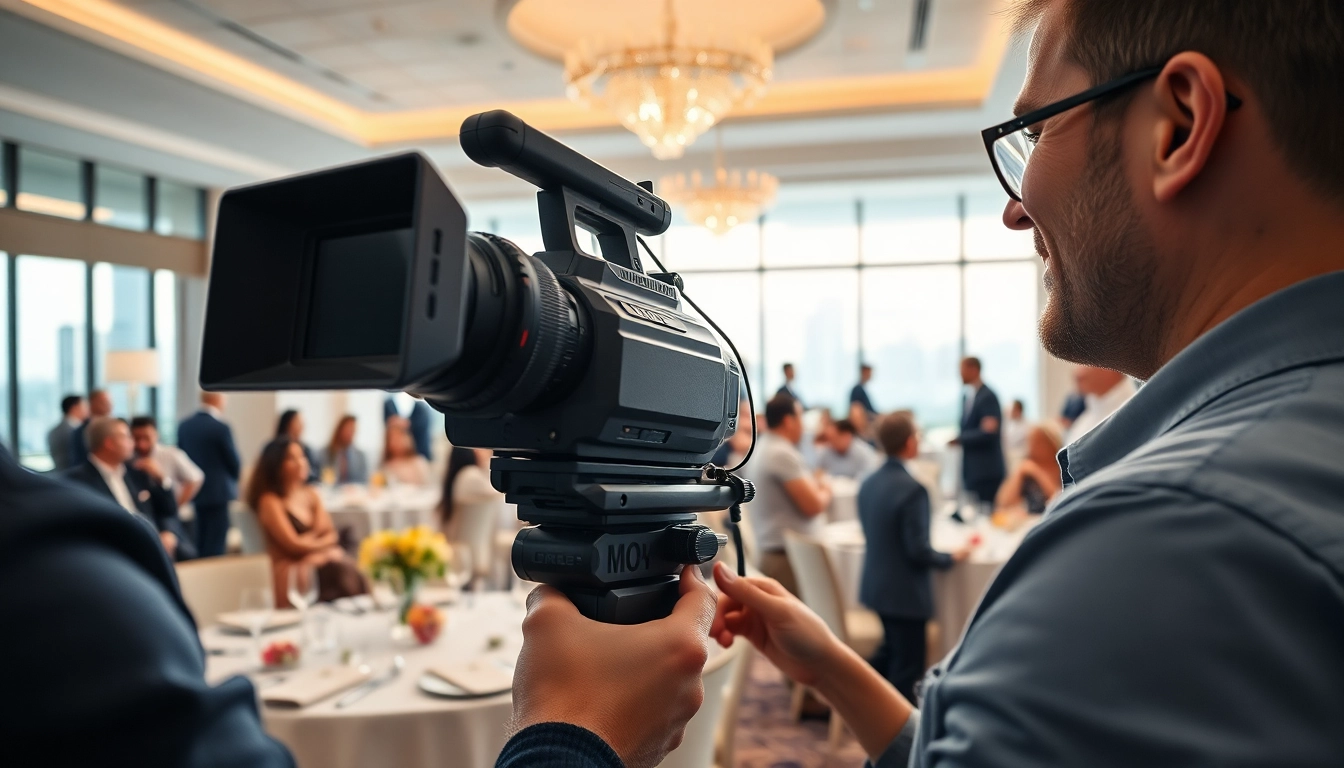Understanding Miami Corporate Event Videography Photography
In today’s fast-paced corporate world, capturing high-quality media during events has become paramount for conveying professionalism and enhancing brand image. Whether it’s a product launch, conference, or a corporate retreat, the demand for effective visual storytelling is continuously growing. This article explores the nuances of Miami Corporate Event Videography Photography, illustrating its importance, best practices, and how to maximize its benefits for your organization.
What is Corporate Event Videography?
Corporate event videography refers to the professional capture of video footage during corporate gatherings. Unlike traditional cinema or documentary filmmaking, corporate videography focuses on creating content that serves specific business objectives. This can include promotional videos, training materials, or internal communications. The aim is not merely to document an event but to tell a compelling story that aligns with an organization’s branding and marketing strategies.
Videographers often work closely with clients to understand their vision and goals, capturing essential moments and interactions that represent the essence of the event. This creates a vibrant narrative that can be shared internally or externally, allowing businesses to connect with their audience on a deeper level.
Importance of Professional Photography for Events
While videography plays a vital role in documenting corporate events, professional photography remains equally significant. High-quality images can encapsulate emotions and moments that videos may not effectively convey. Photos can be used for a range of purposes, such as marketing materials, internal reports, and social media engagement.
Investing in professional photography ensures that your event is represented with clarity and style, which strengthens the company’s brand identity. Additionally, well-produced photographs enhance the visual appeal of post-event materials, allowing organizations to maintain a professional appearance in all communications.
Key Differences: Videography vs. Photography in Corporate Events
Understanding the distinctions between videography and photography is crucial for achieving your corporate event objectives. Here are the key differences:
- Medium of Expression: Videography captures motion and sound, allowing for a dynamic presentation of events, while photography freezes moments in time, emphasizing details and expressions.
- Duration: Videography can tell a longer, more in-depth story, which can be beneficial for tutorials or extended presentations. Photography, however, is more focused on delivering instant impressions and highlights.
- Post-Production: Video editing is often more complex, involving cuts, transitions, effects, and sound editing. Conversely, photo editing typically focuses on color correction, cropping, and retouching.
- Usage: Videos are often used for social media ads, marketing campaigns, and internal communications, while photographs might be used for brochures, website galleries, and event recaps.
Selecting the Right Videographer in Miami
Choosing the right videographer is pivotal for ensuring that your corporate event is captured effectively. Given the array of options available in Miami, understanding what to seek in a corporate event videographer is essential:
What to Look for When Hiring a Videographer
When selecting a corporate videographer, consider the following factors:
- Experience: Look for a videographer with a solid portfolio that showcases their experience in corporate events. Investigate their ability to handle various environments and situations.
- Technical Skills: Ensure they are equipped with professional-grade equipment and stay updated with the latest videography techniques and editing software.
- Style: Assess their filming and editing style to ensure it aligns with your corporate brand. Review previous work to understand their storytelling approach.
- Flexibility: Events often require adjustments on the fly. A good videographer should be adaptable to changes in schedules, venues, and event dynamics.
Questions to Ask Before Booking a Corporate Event Videographer
To ensure the right selection, ask your prospective videographer the following questions:
- What is your experience with corporate events specifically?
- What is included in your packages? Do you offer both videography and photography services?
- Can you provide references or testimonials from past clients?
- What is your typical turnaround time for editing and delivering the final product?
- How do you handle any unexpected issues that may arise during the event?
Reviewing Portfolios: What to Consider
When reviewing portfolios, look for the following aspects to evaluate the quality of work:
- Diversity of Events: Check if the videographer has experience with various types of corporate events, such as conferences, product launches, or trade shows.
- Technical Quality: Analyze the visual and audio quality of the footage. The best videographers use high-definition cameras and professional sound equipment.
- Editing Skills: Look for polished and engaging edits that maintain a good narrative flow. The best videos balance visual interest with essential information.
- Client Satisfaction: Consider any awards, client testimonials, or positive reviews that indicate the videographer’s reputation and service quality.
Best Practices for Corporate Event Videography Photography
To maximize the impact of your corporate event media, implementing best practices in both videography and photography is vital:
Planning Shot Lists and Key Moments
A comprehensive shot list helps ensure that no important moment goes undocumented. Collaborate with relevant stakeholders to identify key moments that should be captured, such as speeches, award presentations, or audience interactions. Developing a timeline for these moments can assist the videographer in capturing everything seamlessly.
Consider creating a list that addresses not just planned activities but also spontaneous interactions that may arise, ensuring a mix of scripted and candid footage that captures the event’s true spirit.
Utilizing Lighting and Angles for Impactful Captures
Lighting plays a critical role in both videography and photography. Properly lit scenes greatly enhance the mood and clarity of the images captured. Here are some strategies to maximize lighting:
- Natural Light: Utilize available natural light where possible. It provides a soft and flattering effect on subjects.
- Supplemental Lighting: Utilize softboxes, reflectors, or LED lights to enhance lighting based on the event’s venue and ambiance.
- Varying Angles: Encourage videographers to explore different angles and perspectives to create dynamic footage. Shots from various heights or distances can represent the event more interestingly.
Integrating Audio Techniques for Enhanced Videography
Good audio can significantly enhance the quality of corporate event videos. Proper audio integration involves:
- Using Quality Microphones: Equip speakers and key participants with lavalier or handheld mics to ensure clear audio capture during speeches and interactions.
- Avoiding Ambient Noise: Choose microphone placements strategically to minimize background noise, especially in crowded or noisy venues.
- Post-Production Adjustments: Utilize audio editing software to enhance the sound quality further, balancing dialogue, background music, and environmental sounds to create a cohesive audio experience.
Promoting Your Event Through Videography
Once you have high-quality video footage, the next step is to leverage it for marketing your event and enhancing your corporate image:
Using Videography in Marketing Campaigns
Incorporating event videos into marketing campaigns allows you to showcase your company’s vibrant work culture and the value it offers. Here are effective ways to do so:
- Highlight Reels: Create short highlight reels from events that convey the event’s atmosphere and core messages, and share them on various platforms.
- Website Integration: Embed event videos on your corporate website to demonstrate engagement, innovation, and professionalism.
- Email Marketing: Use clips in newsletters or email campaigns to engage your audience with visual elements that convey information more dynamically.
Strategies for Sharing Event Highlights on Social Media
Social media platforms are ideal for sharing dynamic content. Consider these strategies for effective sharing:
- Platform Optimization: Tailor video formats and lengths to fit the specific requirements of each social media platform, like Instagram, Facebook, or LinkedIn.
- Engage Your Audience: Encourage audience interaction by creating polls, Q&A sessions, or discussion opportunities surrounding the event content.
- Consistent Branding: Maintain uniformity in branding elements, such as logos and color schemes, throughout the video content to strengthen brand identity.
Creating Engaging Recap Videos for Future Opportunities
Recap videos synthesizing key moments provide lasting impressions of your event for attendees and stakeholders. To create engaging recap videos:
- Focus on Highlights: Highlight essential moments that resonate with viewers, ensuring they can quickly grasp the event’s significance.
- Interviews and Testimonials: Incorporate clips of attendee testimonials or interviews with key personnel for authenticity and relatability.
- Call to Action: Conclude with a strong message or call to action that invites viewers to learn more or join future events.
Measuring Success and ROI of Corporate Videography Projects
To evaluate the effectiveness of your corporate event videography, measurement is essential. This helps in understanding the return on investment (ROI) and determining future strategies:
Setting Goals for Your Event Videography
Establish clear objectives before your event, which may include increasing brand awareness, boosting engagement, or generating leads. These goals will help inform what metrics to consider during the evaluation process. Aim for both qualitative and quantitative goals, ensuring you measure the effectiveness comprehensively.
Assessing Audience Engagement and Feedback
Collect feedback from participants to gauge their response to the event and the media produced. This can include:
- Surveys and Polls: Conduct post-event surveys to assess attendee satisfaction and interest in future events.
- Social Media Engagement: Analyze engagement metrics like views, shares, and comments on shared videos and posts.
- Direct Feedback: Encourage personal feedback during follow-up communications to gain insights into their experiences and preferences.
Utilizing Analytics to Improve Future Events
By systematically evaluating gathered data and insights, organizations can identify areas for improvement in both event execution and media production:
- Data Analysis: Utilize analytics tools to understand audience behavior and preferences better, identifying patterns and trends emerging from each event.
- Iterative Learning: Leverage lessons learned from past events to improve decision-making processes for future videography projects.
- Strategic Adjustments: Refine your approach based on analytical insights, resulting in a more impactful presentation of your corporate identity and objectives.
In conclusion, investing in Miami Corporate Event Videography Photography holds immense potential for businesses looking to enhance their brand image and connect deeply with their audience. By understanding the dynamics of this medium, selecting the right professionals, implementing best practices, and measuring outcomes effectively, organizations can create lasting impressions that resonate far beyond the event itself.



